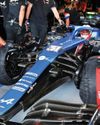
Audi’s R8 Le Mans Prototype set a new standard in endurance racing. The car won for the first time at Sebring in 2000, and that year went on to record the first of five wins at Le Mans. The legend grew with every race. Tom Kristensen, Emanuele Pirro and Frank Biela won Le Mans three times together between 2000 and 2002, Audi drivers won the American Le Mans Series every year from 2000 to 2005 for Audi Sport North America, Team Joest and Champion Racing, and the European Le Mans Series for Apex Motorsport. The car looked unbeatable.
The R8 firmly established Audi in endurance racing at a time when the sport needed the stability. From 1999, when six manufacturers competed, just three continued in 2000 including Cadillac, Chrysler through its Mopar brand and Audi. BMW continued in private hands, but it was a shock to the system after the drama and excitement of 1999.
Audi had contested the 1999 race and was relieved to come out of it with a podium on its first visit to Le Mans. The brand had arrived in endurance racing to great fanfare in December 1998 with a presentation of a prototype in Berlin that bore more resemblance to its future production cars than the cars that actually raced.
The R8 was Audi’s first ever attempt at a fully fledged prototype, having previously only ever developed racecars from production ’shells and the 3.6-litre V8 was the manufacturer’s first dedicated race engine since the 1930s.
As it was all new, there was a steep learning curve for the Ingolstadt team of designers and engineers before the start of one of the most successful Sportscar racing programmes ever.
This story is from the June 2020 edition of Racecar Engineering.
Start your 7-day Magzter GOLD free trial to access thousands of curated premium stories, and 9,000+ magazines and newspapers.
Already a subscriber ? Sign In
This story is from the June 2020 edition of Racecar Engineering.
Start your 7-day Magzter GOLD free trial to access thousands of curated premium stories, and 9,000+ magazines and newspapers.
Already a subscriber? Sign In
Talk the torque
More thoughts on in-wheel motors and their effects on twisting force
Rolling about
An explanation of the limitations of a previous load transfer article, bringing jacking forces into the mix
F1 breaks schedule records
The FIA has confirmed no fewer than 23 races on the 2022 Formula 1 World Championship schedule, the highest number of grands prix ever to be held in a single season, and that has led to criticism from some teams that will be on the road for eight months.

Under pressure
Toyota may have finished first and second at Le Mans this year, but the effort required to overcome a fuel delivery problem and finish with both cars was Herculean
Physics at work
Dutch company, Intrax, offers Racecar Engineering an insight into the technologies it employs to optimise its suspension products
Williams' 2030 ambition
Williams Racing has committed to becoming climate positive by 2030 as part of an all-new sustainability strategy.
Diff'rent strokes
Racecar looks at the different types of mechanical differential, their benefits and limitations
Das Boot
A curious Twitter exchange fired up a unique, hydrogen-powered, cross-country project that will contest the Baja 1000 in November 2022

Air born
Every racecar engineer's dream is a blank sheet of paper design. When Hoonigan and Subaru approached Vermont Sportscars about building the next generation of Gymkhana racer, that's just what the company was given

Remote control
Called variously ‘virtual garages’, ‘mission control’ or ‘race support rooms’ is the future of race engineering sitting in the warm back at HQ?